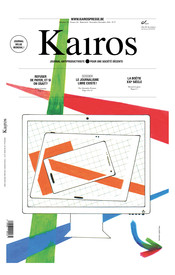Cette page aurait normalement dû être remplie de témoignages de stagiaires ou nouvelles recrues des médias dominants. Le système en a voulu autrement : la peur, l’angoisse de la précarité, la crainte du rejet conformiste… Eh oui, chers lecteurs, nous sommes dans un pays libre!(1)
«L’objectif des médias est d’attirer le public non pour lui-même mais en fonction de son pouvoir d’achat »
N. Chomsky & H. Edwards, p.50
C’était quelque part en Belgique un samedi d’octobre. Je tenais un stand pour Kairos, en famille. Alors que je vais faire un tour aux autres stands, je croise une fille qui, dans la discussion, m’apprend qu’elle a de nombreuses copines qui professent dans de «grandes» rédactions et que leur étonnement par rapport à ce qui s’y passe, ce qu’on leur demande de faire, est à la mesure de leur dégoût. Ça tombe à pic: je fais un dossier sur le sujet dans le prochain! Échange d’adresses mails et, à peine rentré, je lui écris.
Trois jours après, pas de réponses. Impatient, je relance.
Bonsoir .….….….….….….,
Je suis peut-être oppressant, mais as-tu déjà pu évoquer ma proposition avec certaines de tes amies?
Ça les intéressera peut-être, toi aussi d’ailleurs: https://www. arretsurimages.net/articles/2016–05-20/EgyptAir-Le-Soirvire-une-journaliste-et-enflamme-Facebook-id8784
Au plaisir de te lire, Alexandre
Bonjour Alexandre,
Oui j’ai contacté les deux amies auxquelles je pensais. Je leur ai expliqué le projet et leur ai transféré ton mail.
J’espère qu’elles te contacteront. Elles sont tout de même un peu hésitantes car elles craignent pour leur emploi qu’elles ont eu tant de mal à trouver. Je les vois prochainement, j’en discuterai encore avec elles. Merci pour l’article très intéressant et qui pose vraiment question.
Belle journée à toi,
.….….….….….….….….
Merci!
Oui, je comprends bien leur crainte. Il faudrait qu’elles puissent parler sans être reconnues. En tous cas, si elles devaient refuser, qu’elles consignent tout ce qu’elles vivent quotidiennement dans ces rédactions, cela pourra certainement un jour leur servir.
Dis-leur bien que quoi qu’elles me disent, je ne publierai rien sans leur autorisation.
A bientôt,
Alexandre
Premier refus. Mais comment ne pas les comprendre aussi? Cette conscience de ce qui se passe à l’intérieur, mêlée à une impossibilité de le dire publiquement, amènera toutefois des solutions qui, à part la défection (voir dans ce dossier l’article «Le conflit mental « indépassable » des journalistes»), n’auront rien de réjouissant quant à la perspective d’exercice de l’esprit critique. Si elles choisissent de rester, les compromis se feront vite compromissions, d’autant plus facilement que les déterminants matériels de l’existence (dans lequel l’endettement et son nécessaire remboursement occupent une place de choix) les y obligeront.
« Les subventions aux médias sortent de la poche du contribuable de telle sorte qu’en fin de compte ce dernier paye pour être endoctriné dans l’intérêt de puissants groupes d’intérêts comme ceux qui bénéficient de contrats d’armement et autres sponsors du terrorisme d’État ».
N. Chomsky & H. Edwards, p.60
Elles deviendront peut-être ces journalistes conformistes que nous critiquons aujourd’hui, aveugles à la réalité et défendant leur statut à tout prix, à défaut de leur intégrité. Mais peut-être pas? Elles ne sont pas encore ces journalistes qui s’aplatissent devant le pouvoir, les paillettes et font des ronds de jambe aux politiques. Et c’est pourquoi notre mise en évidence des mécanismes de reproduction a plus que jamais sa raison d’être. Nous ne pouvons donc nous contenter de dénoncer une faiblesse chez l’autre, une couardise qui l’empêcherait de changer de boulot, gueuler, refuser la soumission. Car si nous nous employons à mettre en évidence les mécanismes d’aliénation et de domination des sujets, notamment ceux des médias, il ne faut pas tomber dans le travers facile d’en rendre totalement responsables ceux qui en sont les victimes. Même si nous voulons et devons encore croire qu’il y a toujours une marge de responsabilité et donc une possibilité de changement individuel, il reste que le sujet est grandement déterminé par sa position dans la structure sociale et que le rendre entièrement responsable des effets de ces mécanismes dont on connaît l’efficacité et le caractère insidieux, serait du même coup nier qu’un mécanisme efficace puisse avoir des effets efficaces… Un peu comme si on considérait que le sujet pouvait être hors influence. Comme l’énonçait Bourdieu, «quand on fait de la sociologie, on apprend que les hommes ou les femmes ont leur responsabilité mais qu’ils ou elles sont grandement définis dans leurs possibilités et leurs impossibilités par la structure dans laquelle ils sont placés et par la position qu’ils occupent dans cette structure ».(2)
« En ne rencontrant que des « décideurs », en se dévoyant dans une société de cour et d’argent, en se transformant en machine à propagande de la pensée de marché, le journalisme s’est enfermé dans une classe et dans une caste »
S. Halimi, p.145
Il y a des choses «impossibles» pour nous, pour elles, pour l’instant. Ces «impossibles» peuvent se muer en possible, et une des clefs est, avec certitude, que tous nous puissions dénoncer ces mécanismes. Il faut donc prendre des risques, seul si on en a le courage. A plusieurs si nous maîtrisons l’information et médiatisons tous ceux qui agissent seuls…
Alors, vive les taupes! Plus nous serons, plus nous serons forts. Venez témoigner, dire ce qu’il se passe à l’intérieur. Kairos vous offre un terrier d’expression !
Principaux ouvrages cités en exergue dans ce dossier:
Alain Accardo, Journalistes précaires, journalistes au quotidien, Éditions Agone, 2007
Pierre Bourdieu, Sur la télévision, Éditions Raisons d’Agir, 1996
Noam Chomsky & Edward Herman, La fabrication du consentement, de la propagande médiatique en démocratie, Éditions Agone, 2008.
Serge Halimi, Les nouveaux chiens de garde, Éditions Raisons d’Agir, 2005
Dossier réalisé par Alexandre Penasse
- Nous réitérons notre pratique de noircissement des mots, comme nous l’avions initiée dans le K19 pour l’interview de l’accompagnateur de train (http://www.kairospresse.be/article/le-rail-les-machines-et-la-voie-royale-vers-la-privatisation), afin de préserver l’anonymat de la personne et éviter les représailles professionnelles.
- Pierre Bourdieu, Sur la télévision, Éditions Raisons d’Agir, Paris, 1996, p.62.








